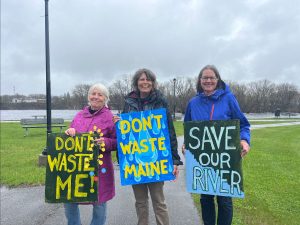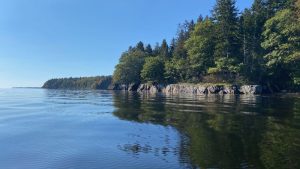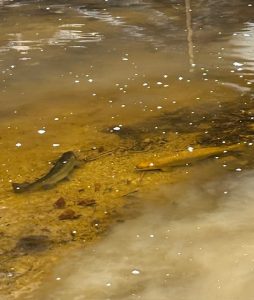This is the first part of the transcript from the Maine Conservation Voters’ Lunch and Learn on Tribal Sovereignty and Efforts in the Maine Legislature, a webinar they hosted in March . Penobscot Nation Ambassador Maulian Dana introduces the issue and Passamaquoddy Tribal Citizen and Attorney Corey Hinton breaks down the Task Force recommendations included in the bill LD 1626 “An Act to Implement the Recommendations of the Task Force on Changes to the Maine Indian Claims Settlement Implementing Act”. These include trust land acquisition, use of land and natural resources, hunting and fishing, taxation, criminal jurisdiction, civil jurisdiction, and the applicability of federal laws to the Tribes in Maine.
Update: LD 1626 will have a public hearing before the Legislature’s Judiciary Committee on Tuesday, Feb 15th at 9am.
Changes to the Maine Indian Claims Settlement Implementing Act: A Break Down of What the Bill Would Do
Maine Conservation Webinar Host Kathleen Meil:
Thank you so much for joining us for today’s Lunch and Learn, Tribal Sovereignty and Efforts in the Maine Legislature. Ensuring that Wabanaki people’s inherent sovereignty is recognized by the State of Maine this year is a top priority for many of us, including Maine’s Environmental Priorities Coalition. Restoring the Wabanaki Tribes’ ability to manage Tribal lands, waters, and resources make sovereignty an environmental issue, but at its heart sovereignty is about fairness, equity and righting wrongs. We are joined today by Penobscot Nation Ambassador, Maulian Dana, and Passamaquoddy Tribal citizen and Attorney, Corey Hinton. My name is Kathleen Meil. I am the Director of Policy and Partnerships at Maine Conservation Voters and Maine Conservation Alliance. Our organizations work to protect Maine’s environment and our democracy through education, collaboration, advocacy, and political action.
Maulian Dana: Penobscot Nation, Tribal Ambassador:
It’s really great to see you all. My name is Maulian Dana. I’m the Tribal Ambassador for the Penobscot Nation. I also serve as the President of the Board of Directors for the Wabanaki Alliance, and I’m super excited to be able to share with you some of our efforts going on in this legislative session, the 130th. A lot of it is carrying over from the 129th when our work, like a lot of peoples’ work, was disrupted by the pandemic. We were able to get some pretty historic votes out-of-committee when it comes to amending the Land Claim Settlement Act. So we are hopeful going forward, but we know that it’s still quite the journey ahead of us. So we’re really happy to have as much support around Maine as we can get. Thank you to Corey Hinton for adding his expertise here today. He’s a very brilliant legal mind, and it’s always really special to me to have a Passamaquoddy citizen leading the charge in the legislature around this from a legal perspective.
I think it’s really significant and awesome. So the big picture we’re going to talk about today is amending the Maine Indian Land Claims Settlement Act through legislation and the Maine Legislature, because we are looking to create more equity and fairness for the Tribes in Maine. Now the Wabanaki Tribes are the Passamaquoddy, which have two communities, one at Motahkomikuk or Indian Township, one at Sipayik or Pleasant Point. There is the Penobscot Nation, which is kind of centrally located in Maine. And then up in Aroostook County, we have the Houlton Band of Maliseet Indians and the Aroostook Band of Micmacs. And while this legislation really only affects the Passamaquoddy, Penobscot, and Maliseet, we’re also really honored and blessed that the Mi’kmaq are adding their voice to this charge of unity that we’ve really found around this effort. Part of the Maine Indian Land Claim Settlement Act was language added in the 11th hour that has blocked our access to Federal Beneficial Acts that every other tribe in the country is entitled to and enjoys.
We are entitled to them, but we haven’t had access to them. So a big part of the oppression of the Tribes in Maine for the past 40 years, since this passed into law has been not being able to really have our inherent sovereignty recognized, but also that relationship with the federal government has been really stifled, and at times non-existent. We were able to work through the Violence Against Women Act law through the Maine Legislature to expand that jurisdiction to Maine Tribes, but it was a really complicated and difficult process. So we are looking to finally amend this on a very large scale and it truly is all about fairness and equity.
So how did we get here? I think Corey can get into this a little bit in more detail on the court cases and such, but I will tell you that the Maine Indian Land Claims Settlement Act has been studied to death. Recommendations have been made time and time again, and it has always fallen flat and fallen short. A lot of the recommendations are pretty much in line with what we’ve crafted this time. And the process this time was a Task Force called by the state government that basically comprised of Tribal Leaders or Tribal Chiefs or their designee and lawmakers as the voting members. And then the Attorney General’s office and governor’s office were also included in the meetings as non-voting members. So these 22 recommendations, a lot of which we’ll get into in detail here, were voted unanimously, nearly unanimously, out of this Task Force. And that is what we’re basing the bill on. And, Corey, if you want to talk about exactly how the land claims came to be with the court cases.
Corey Hinton: Passamaquoddy Tribal citizen, Passamaquoddy Attorney
~History~
Hi, everybody. My name is Corey Hinton. Ambassador, thank you so much for the introduction and getting us to this point. I’m grateful for the opportunity to be with you all today and for the support of the environmental coalition. The first bullet that you see on this slide, Joint Tribal Council of the Passamaquoddy Tribe v Morton. That is a lawsuit that the Passamaquoddy tribe brought against the United States in 1975 to essentially force federal recognition. Up until the 1970s, the Tribes in Maine had been presumed to be under the exclusive jurisdiction of the state bar none, but there was a sentiment among the Tribal communities that that was not correct. And in fact, perhaps illegal given how the relationship between Tribes and the United States and states exists elsewhere. So the Passamaquoddy Tribe brought the lawsuit, sued the United States, and that resulted in a landmark decision, which recognized the Passamaquoddy Tribe and the Penobscot Nation as federally-recognized Tribes like any other.
And it essentially recognized that the State of Maine’s perspective that the Tribes were under the thumb of the state and that they had no jurisdiction that didn’t flow from the state. This opinion proved that wrong. Following 1975’s Morton decision, there were three other core cases that led to the Settlement Act. Two of those court cases involved attempts by the Tribes in Maine to utilize and exercise sovereign powers that other Tribes have elsewhere. One of those cases related to whether or not the Passamaquoddy Tribe had criminal jurisdiction over activities on its reservation and the other dealt with whether or not the Tribe had sovereign immunity from lawsuit, a critical aspect of Tribal sovereignty. And in both of those cases, one which went through the first circuit and in one that went to the Maine Law Court, the courts ruled in favor of Tribal sovereignty and essentially said, just because the State of Maine didn’t recognize these Tribes does not mean that these are not Tribes like any other Tribe of the United States.
And that the takeaway from those cases was very clearly that the Tribes in Maine have the rights, privileges, benefits, and immunities of every other federally-recognized Tribe in the United States. Those cases were between maybe like 1978, 1979, and they prompted the Settlement Act negotiations, which really only came about because the United States sued the State of Maine. The United States sued the State of Maine. The Tribes did not sue the State of Maine for illegal dispossession of the Tribes of their land. And so when US v Maine was brought by the United States and after those court decisions said that the Tribes have jurisdictional powers like other Tribes, the State of Maine came to the table and negotiated very, very hard. And those negotiations resulted in a two-part settlement. The first is the Maine Implementing Act, which sets the jurisdictional which generally have a Tribal state, or sorry, a Tribal-Federal model, the Implementing Act implements a Tribal-State model.
And then the federal component essentially authorized the state component. It created the Land Claim Settlement Fund, and essentially constituted the federal government’s relinquishment of some of its obligations with respect to Tribal lands in Maine. There’ve been several attempts since 1980 to re-examine parts of the Settlement Act prior to the Task Force of 2019. And these efforts were all born out of recognition that the settlement has had a disproportionately negative impact on the Tribes. The Tribes have not been able to acquire the lands that they were authorized to acquire. And the jurisdictional components of the Settlement Act have proven to essentially strangle economic development and Tribal self-determination at just about every turn.
As a result, as the Ambassador said, the Tribes of Maine are not exercising the benefits and immunities that other Tribes exercise elsewhere. And even some of the activities of the Tribes were engaged in at the time of the Settlement Act turned out to be deemed not lawful under the Settlement Act. It’s just something that the Tribes never really bargained for. And that’s that last bullet there. The Penobscot Nation was engaged in gaming. They didn’t believe that they were negotiating away their right to conduct economic development. It turns out the State of Maine had had that exact thing in mind. And so that business of the Penobscot Nation was shut down because of the Settlement Act.
~Task Force on Changes to the Maine Indian Claims Settlement Implementing Act~
The recommendations for the Task Force, which met from 2019 until, well from July or so of 2019 until December of 2019 touched on large categories that cover pretty much all aspects of Tribal jurisdiction. You see them listed here, but it’s trust land acquisition, use of land and natural resources, hunting and fishing, taxing, criminal jurisdiction, civil jurisdiction, gaming, and the applicability of federal laws to the Tribes in Maine. The recommendations, as the Ambassador said, were nearly unanimous. They were all unanimous with the exception, I think, of just one or two criminal jurisdiction recommendations that were, I think, there was just one dissenting vote. And the recommendations were then placed into legislation that was LD 2094 in the last legislature. But even if passed by the legislature, all of these revisions would require the Tribes to adopt the changes to the Settlement Act through their own lawmaking processes, which is exactly what was required during the original Settlement Act process.
~Tribal Lands: Trust Land Acquisition~
At the end of the day, the goal is for the Tribes to be able to, in all of these subjects that you see, exercise the powers and benefits that other Tribes have. As we talk about some of these issues, we like to talk through what Tribal lands means, and this comes up a lot. There are generally three categories of lands that are owned by Tribes in the United States. The first category is reservation land. Maulian mentioned Indian island, and Sipayik and Modahkmikuk. Those are examples of reservations that have been held since time immemorial. In other words, the Tribes have always held those communities and those lands were reserved, and they are protected for that reason. The second large category is trust lands. The process for lands to become trust lands, and, sorry let me take a step back, trust lands means that lands are owned by the United States and held in a protected trust status for the benefit of a Tribal nation.
That process to put the lands in trust is only complete after the Department of the Interior receives an application and goes through an internal administrative process that is both part internal, and then it’s part external because there’s requirements for consultation with local governments and state governments. And trust lands are how most of the Tribes’ territory in Maine is held. Trust lands are what the Tribes were allowed to acquire as a part of the actual Land Claim Settlement. So that a hundred each tribe, Passamaquoddy and Penobscot, was allowed to acquire up to 150,000 acres of trust lands. And neither Tribe has acquired that amount. Fee lands, fee lands is a reference to lands that, you know, that anyone would hold, you would hold a fee title to your house if you own your house. And Tribes, in the same way, will own lands that are not in this restricted reservation status or in a restricted trust status.
And the Tribes in Maine have, in some situations, fairly high levels of fee land ownership, and many of those lands have not been able to go into trust status because the Settlement Act creates a very challenging process for those lands to go into trust that often requires the payment of fees and state and local consent. And that process to convert fee lands to trust lands for the Tribes in Maine is much, much different and much more expensive and complicated than it is for Tribes elsewhere in the United States.
To take a step back and think about where the Tribes are in Maine, we like to use this graphic here. Important to note that this is a Penobscot map. So where it says trust lands in red, these are Penobscot Nation trust lands. In green, this is Penobscot fee lands in Carrabassett Valley. And then you’re not going to see a lot of fee lands for Maliseet and Micmac because they don’t have very many, but you’ll see that Penobscot and Passamaquoddy have been able to acquire some trust lands, but they are quite sporadic, and by no means have the Tribes sort of bought up all of the State of Maine.
~Task Force Recommendations on Trust Land~
In the arena of trust land acquisitions, the Task Force recommendations were effectively to enable the Tribes to acquire all of the lands that were guaranteed to them under the Settlement Act. This is a very, very, it was a fundamental premise of the Settlement Act. And it’s one that’s totally unfulfilled, which, you know, I think sort of underscores the fact that the Settlement Act, as conceived and executed and implemented, is a failed model. The fact that the state government and local governments can veto the Tribe’s ability to put land into trust has been a major problem for the Tribes. And so the Task Force recommendations would eliminate local veto for Tribes, for lands that the Passamaquoddy Tribe already holds in fee status. With respect to Penobscot, Penobscot is, and for all other lands, the parties would be agreeing to a process that doesn’t require local consent, but that does require that there be significant government-to-government cooperation prior to any lands being put forward to the United States for trust acquisition.
Essentially, this is intended to facilitate that fundamental principle of the Settlement Act, putting those 150,000 acres of land in trust. And beyond that, the Tribes seek access to the same federal laws that other Tribes use to put lands in trust. And there’s an 80, 90 year-old law now called the Indian Reorganization Act. That’s been applied by Interior, Department of the Interior to put lands in trust and the Tribes effectively seek access to that process. As this bottom bullet says, the Tribes can only engage in that process if there are effectively laws passed by the Tribe to authorize efforts to put lands in trust, and as I mentioned before, the federal process does require consideration in most areas of local considerations, and tax implications and jurisdictional conflicts.
~Land and Natural Resources~
In the arena of land use and natural resources, the Task Force recommendation was quite broad and simple. It was to restore and affirm the Tribes’ right to regulate natural resources and land use within their territories. This means that the Tribes would be able to regulate commercial, residential, and really any type of land use on Tribal lands through zoning codes, you know, dealing with local communities, or it could be, you know, more broadly natural resource regulations that would apply to Tribal members and non-Tribal members. It’s important to note that the Tribes do currently have some authority to regulate on-reservation activities. So, you know, for example, I know the Penobscot Nation has adopted significant parts of the Maine Revised Statutes with respect to certain natural resource regulation issues. But there are areas where the Tribes definitely have limited authority. And there’s been a slew of litigation going back to the early 2000s around the ability of the Tribes to effectively act as a state with respect to administering their on-reservation status.
There are processes in place for Tribes and states to apply to the EPA, for example, to regulate their environment and Tribes elsewhere in the United States use this all the time, every single day. And the State of Maine has generally fought the ability of the Maine Tribes to exercise that authority because the State of Maine has argued that the Tribal exercise of environmental regulatory authority would conflict with the Settlement Act. And so essentially the Tribes are hoping to have confirmed ability, and slightly expanded authority, more clear authority, to exercise environmental rights and benefits that are available to other Tribes elsewhere in the United States. With respect to fish and game, the Task Force recommendations were to recognize Tribal laws that currently regulate hunting and fishing on Tribal lands. It’s important to note that the Settlement Act currently permits the Tribes to regulate hunting and fishing activities on Tribal lands, but it limits the ability of the Tribes to actually enforce those laws with respect to non-tribal citizens.
~Fishing and Hunting~
So this Task Force summary would essentially confirm the Tribe’s ability to have those laws and would bolster their ability to enforce those laws and regulations. As a part of this category, the Task Force recommendations also recognize that the Tribes, in some situations, may have reserved rights that guarantee the ability to say, fish off-reservation land. And the Task Force recommendation in this arena was to recognize the state’s ability to regulate Tribal activities off-Tribal lands to the extent consistent with Tribal treaty or Tribal reserved rights. This essentially means that non-Tribal members will be required to submit to Tribal law and Tribal lands when hunting and fishing. And it means that Tribal members would be able to engage in their treaty-guaranteed fishing rights off-reservation provided that such uses are consistent with environmental laws and are consistent with the treaty rights. And in any of these situations where activities on or off reservation posed a threat to the environment federal law provides for states to step in and to work with Tribes to address those threats to the environment.
~Taxation~
Taxation authority is one way that Tribal Nations, really all governments in the United States, generate revenue. Right? The Tribes in Maine do not have the authority to be taxing entities. And so the Task Force recommendations in this realm would recognize the Tribes’ authority to tax Tribal members and Tribal entities on Tribal lands. And it would also recognize that Tribal members’ activities on Tribal lands are exempt from state and local taxation. This means essentially adopting the rules of Federal Indian Law that apply to tax elsewhere in the United States. This means that Tribal member income earned on Tribal lands would not be subject to the state income tax. That means that if I was to start a basket-making operation on the reservation, using materials that I harvested on the reservation, those sales from my shop would not be subject to state sales tax. It would mean though that the Tribes could tax those activities if they would like, and this is what we mean in terms of the creation of governmental revenue.
The recommendations in this realm are essentially to enable the Tribes to become a taxing authority, if they would like, to generate revenue from taxing on Tribal lands. But in many situations how this plays out in Indian Country is that although Tribal activities will be exempt from state taxation, non-Tribal activities may still be subject to state taxation. And so what happens, and the rules are a bit convoluted and they’re generated from Supreme Court cases over the years, so what we see happen is that Tribes and states in places like Arizona, Washington, Oklahoma, really everywhere, they enter into tax agreements where there are agreements to collect taxes and to remit taxes back to the Tribal government. This guarantees a flow of revenue to both state and Tribal governments, but all of this is, would be contingent on really of Tribes passing laws to regulate these activities.
~Criminal Jurisdiction~
With respect to criminal jurisdiction, the Task Force recommendations are to authorize the Tribes to write criminal laws and to enforce criminal laws with respect to Indians, and with respect to non-Indians who commit crimes that are subject to jurisdiction or the Violence Against Women Act. And all that means with respect to non-Indians is that jurisdiction would exist when there are certain categories of domestic crimes that are committed. Generally the Tribes within this framework would be seeking jurisdiction to exercise over classes A, B, and C crimes with the state government retaining overarching jurisdiction over major crimes, which is very similar to how things are handled elsewhere in Indian Country, except that the federal government typically [has] jurisdiction over high-level crimes.
This means though that that Tribes would be able to commit greater resource and would be able to obtain greater levels of resources to expand Tribal courts, which would be exercising greater levels of jurisdiction. Like with all of these categories to Tribes, in order to exercise its jurisdiction would need to pass laws, which they always do, and then to administer those laws. So it’s not as though, you know, on day one, you have a situation where the Tribes have very limited criminal jurisdiction over misdemeanors only, and tomorrow, all of a sudden they have much greater jurisdiction. There would need to be a lawmaking process that occurs in between.
~Civil Jurisdiction~
For civil jurisdiction, the Task Force recommendations were to restore Tribal civil jurisdiction over Indians and non-Indians on Tribal lands. This essentially means that the Tribes would have the ability to write laws that deal in areas of civil jurisdiction and also to adjudicate matters that arrive from implementation of those laws. And here, we’re talking about laws that protect the health, safety, and welfare of the communities. Generally speaking, under Federal Indian Law, Tribes have civil jurisdiction over Indians and non-Indians that are on Tribal lands. And those are the rules that we’re seeking to have applicable here in Maine. But again, this means that the Tribes would need to pass laws to exercise that authority.
And it’s really important to note that right now, with respect to civil jurisdiction, the Settlement Act very, very narrowly defines the jurisdiction that Passamaquoddy and Penobscot have. And the Settlement Act really doesn’t provide any guidance with respect to the Houlton Band of Maliseet’s ability to have a court and to exercise civil jurisdiction. So the Tribes are seeking to, across the board, enhance their jurisdiction in areas where there’s very great disparity right now in the State of Maine, and in the State of Maine with respect to also other Tribes and other states.
~Applicability of Federal Laws~
Finally, with respect to federal laws, the Task Force recommendation was to amend the Maine Implementing Act to allow federal laws that apply elsewhere in Indian Country to apply to Tribes in Maine. It’s important to note, and the Ambassador touched upon this earlier, there is a provision of the Federal Settlement Act that prevents laws passed by Congress for the benefit of Indians from applying in Maine, unless those laws are specifically applicable to Maine. This has blocked everything from the Violence Against Women Act to laws that enhance the ability of Tribes to react to emergencies, to the Tribal Law and Order Act. These are examples of the laws. Another one here is the Indian Gaming Regulatory Act. So in theory, all of these laws have been blocked by the Federal Settlement Act, but the Federal Settlement Act also gives the state and the Tribes the authority to reallocate jurisdiction between them.
~Gaming: Part of Task Force Recommendations, but not part of LD 1626 “An Act to Implement the Recommendations of the Task Force on Changes to the Maine Indian Claims Settlement Implementing Act”~
So here, the Tribes are seeking access to federal laws that Congress has passed for the benefit of Tribes elsewhere. And that does not mean that the Tribes would be operating freely. I mean, these are federal laws and like with the Indian Gaming Regulatory Act, for example, there are very precise and well-defined regulatory frameworks that exist for administering those laws. And so the Tribes would be operating under federal law. It’s not like they would be totally immune from law altogether. And then gaming, the Task Force recommendation was to permit the Tribes to decide whether or not they would like to exercise authority under the Indian Gaming Regulatory Act. This means that the Tribes would be able to conduct gaming in accordance with federal law and would be required to allocate any revenues from their gaming to Tribal members and to their governments themselves. This does not mean that the Tribes could go out
and open casinos on every piece of land that they own.
It would require that, first and foremost, the Tribes pass a law that authorizes gaming. So there must be a policy decision made. That law would then need to be approved by the United States. And if approved by the United States, the Tribes would be able to conduct gaming and there’s different levels of gaming, but the big sort of casino that you see in Bangor, for example, Hollywood Slots, that sort of casino could only exist if there is an agreement reached by the Tribe and the state, and that’s a function of the Indian Gaming Regulatory Act. And so here, the Tribes are not seeking to necessarily open that big casino or not, but we all feel that it’s a very important exercise of self-determination for the Tribes to have the right to be able to decide whether or not they would like to engage in Tribal gaming.






